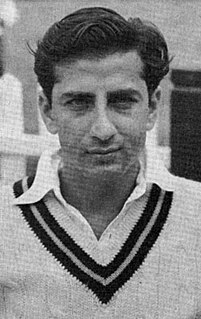The team
- Hanif Mohammad (aged 20) (captain)
- Pervez Akhtar (age unknown)
- Anwar Elahi (age 17 to 19)
- Ghaffar Khan (14)
- Wallis Mathias (19)
- Mohammad Munaf (19)
- Ahmed Mustafa (10)
- Khalil Rana (14)
- Abdur Rasheed (age unknown)
- Salimuddin (12)
- Ziaullah (18)
Anwar Elahi was a Pakistani cricketer who played first-class cricket irregularly from 1953 to 1969.
Wallis Mathias was a Pakistani cricketer who played in 21 Tests from 1955 to 1962. A Catholic, he was the first non-Muslim cricketer to play for Pakistan.

Mohammed Munaf is an Iraqi–American terrorist convicted in 2008 for his role in the March 2005 kidnapping of three Romanian journalists in Iraq. He has been convicted of terrorism charges in Romania but has not yet been brought to Romania to serve his sentence, although Iraq's foreign minister, Hoshyar Zebari, pledged in April 2011 to cooperate with his extradition to Romania. In addition to his conviction in Romania, he was sentenced to death by an Iraqi court in October 2006 for his involvement in the kidnapping of the Romanian journalists in 2005, but his conviction was vacated on technical grounds by the Iraqi Court of Cassation on February 29, 2008, and remanded to the lower court for retrial. His habeas corpus petition to prevent his transfer to the Iraqi government was heard by the U.S. Supreme Court, which denied certiorari; the U.S. Court of Appeals ruling in Munaf v. Geren, which rejected Munaf's claims and ruled that his transfer to Iraqi custody was legally valid, was therefore allowed to stand.
Hanif Mohammad had already played all 13 of Pakistan's Test matches. Two other team members, Wallis Mathias and Mohammad Munaf, later played Test cricket. All of the team had subsequent first-class careers.

Test cricket is the form of the sport of cricket with the longest duration, and is considered the game's highest standard. Test matches are played between national representative teams with "Test status", as determined and conferred by the International Cricket Council (ICC). The term Test stems from the fact of the form's long, gruelling matches being both mentally and physically testing. Two teams of 11 players each play a four-innings match, which may last up to five days. It is generally considered the most complete examination of a team's endurance and ability.
Ahmed Mustafa, who was supposedly only 10 years old at the time of the match, later revealed that he was "actually about 15". [2] There may be other such discrepancies between players' supposed and actual ages.

